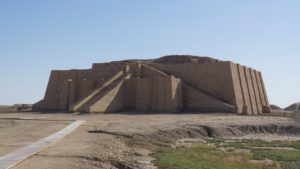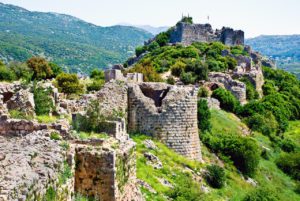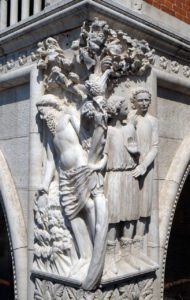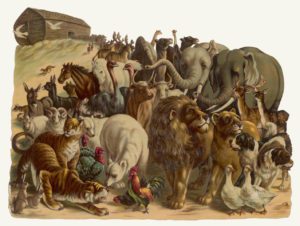filter posts:
Date
Don’t Settle for Less
 We read in Genesis 11 that Terah packed up his worldly possession and with his son, Abram and his nephew, Lot and Sarai, Abram’s wife, headed out of town. The city of Ur was in the rearview as this band of travelers made their way to Canaan. Why? It doesn’t tell us in the text, but at first glance, one would assume that Terah just decided he needed a change of scenery. Wanted to blow the whole “moon-worship-thing” that was hot in Ur and head north to Haran and then southwest to Canaan. A mere 12,000 miles in all if they had done the whole trip at once. But see, dear reader, this is why context is the most important rule in interpreting the Bible. Context includes not just what surrounds the particular verse you are studying, but what the rest of the Bible says about that same verse or that same event. They did make it to Haran, but not to Canaan.
We read in Genesis 11 that Terah packed up his worldly possession and with his son, Abram and his nephew, Lot and Sarai, Abram’s wife, headed out of town. The city of Ur was in the rearview as this band of travelers made their way to Canaan. Why? It doesn’t tell us in the text, but at first glance, one would assume that Terah just decided he needed a change of scenery. Wanted to blow the whole “moon-worship-thing” that was hot in Ur and head north to Haran and then southwest to Canaan. A mere 12,000 miles in all if they had done the whole trip at once. But see, dear reader, this is why context is the most important rule in interpreting the Bible. Context includes not just what surrounds the particular verse you are studying, but what the rest of the Bible says about that same verse or that same event. They did make it to Haran, but not to Canaan.
Question. Did Terah take his family to Haran? Or did God bring them? In Genesis 15, God said to Abram, “I am the Lord who brought you out from Ur of the Chaldeans to give you this land to possess.” You see, sometimes we think we went somewhere, but we look back over our lives and we see “No, God brought me somewhere.” Paul reminds us in his letter to the Philippians, “It is God who works in you, both to will and to work for his good pleasure.” It is God who moves his people where he wants them to be. Can we miss it? Of course. You see that clearly in the wilderness wanderings of the children of Israel. But even then, after their disobedience, God led his people through the detours and back to the path of his will. He does that for us as well. I took a serious detour on my way to marrying Cindy, and I thank God that he loved us enough to bring us to where we both needed to be.
You read on in Genesis 11 and see that the travelers not only stopped but ended up settling in a city called Haran. Why did they stop in Haran and settle there? Lots of reasons, which possibly included the journey was long, the terrain was difficult, and Terah was getting old. It may also be that when they got to Haran, another center of moon worship, Terah missed his old digs and settled for what was comfortable. He chose the security of the known, even though it kept him in a place of compromise. If what we see in the Tower of Babel was a picture of man’s self-effort at creating a world on his own terms, apart from God, then perhaps what we see in Haran is a picture of compromise, of taking the path of least resistance and “settling” in a place that God never intended. We will see that with Lot later, as he moved close to Sodom and then into Sodom and finally Sodom moved into him. Lot settled, and the price he had to pay to get back to God’s path was enormous.
How about you? Have you settled for what is comfortable, known, or easy? Have you set aside the call of God to know Him and to make Him known in exchange for making a name for yourself?
Abraham made it into the “hall of faith” in Hebrews 11, not because of money, reputation, or fame. He made it simply because he chose to believe God. To obey God. And to serve God. “By faith Abraham obeyed when he was called…”
Why not us?
May 29, 2022
What Was Going on in Babel?
 You will find the story in Genesis 11, and it is a case study in the sin-born desire in mankind to make a way to heaven without God. If they can. Here’s what we see in the text.
You will find the story in Genesis 11, and it is a case study in the sin-born desire in mankind to make a way to heaven without God. If they can. Here’s what we see in the text.
They were united. The whole earth was united by one language, which is wonderful, and will happen again in the Kingdom of God. But they moved to the plain of Shinar and there decided they would build something that would give them access into heaven. “Come, let us make bricks,” they said. And then, “Come, let us build ourselves a tower.” And finally, “let us make a name for ourselves.” So, we see that they had ambition, which is not bad. And that they were industrious, working to build something magnificent, which is not bad! God is not against industry and innovation, creativity and art. He is the creator of all of that. And we see that there was unity, which God is certainly not opposed to; he gives us grace to attain it. He wants unity for his children. So, what is the problem? It is not in what they proposed to do but in their motivation. It was two-fold, based on pride and fear.
Pride is preeminent when anyone or any group gathers to do something or build something apart from God, especially when the endgame is to build something that will exalt humanity or even save humanity. John Witherspoon was president of Princeton University when James Madison, who would become the 4th president of the United States, was a student there. Witherspoon was often quoted by Madison later as having said, “Accursed be all that learning which sets itself in opposition to the cross of Christ!” That’s the idea here. Whether it is a school or a business or a nation, or an individual, or even a church, any person or group that exalts its own desires to make a name for itself above the plan and purposes of God is headed for a fall. God’s purpose will stand.
Charles Spurgeon said, “It does not matter whether 50,000 espouse its cause, or only five, or only one. Truth does not reign by the ballot box, or by the counting of heads: it abides forever. All the tongues of men and of angels cannot make truth more true; and all the howlings of devils and doubters cannot transform it into a lie. Glory be to God for this!”
I remember a man telling me years ago that he has a plaque on his desk at work that asks him the same question every day: “What’s your motivation?” It’s a great question. The primary motivation of the people of Babel was pride.
They were also motivated by pride’s companion: fear. They wanted to find security by making a name for themselves, verse 4, “lest we be dispersed over the face of the whole earth.” Ignoring the commission God had given to their ancestors, which was to “be fruitful and multiply and fill the earth,” the people here wanted to do life their own way, and their greatest fear was to just become somebody somewhere who follows God but is not known for doing something great. “Let us make a name for ourselves.” The word for name is “Shem.” Jen Wilkin said they wanted to make another Shem, another way to God besides the lineage that would lead to the Savior. No, God’s purpose will stand.
God says in response, “nothing that they propose to do will now be impossible for them” and it sounds like he is concerned about the collective power of humanity. Like God Almighty is rubbing his hands together, nervous that they might indeed do something big enough and strong enough to be a threat against him. Is that it? This is what the psalmist says about this: “He who sits in the heavens laughs; the Lord holds them in derision.” God sees their evil intent, he knows their hearts, and he knows that their apostasy and wickedness are unlimited. They are hurtling headlong toward the same worldwide wickedness that brought about the flood. They have decided on their own to stay in one place and unite in their rebellion, rather than scatter and serve God all over the world. But God’s purpose will stand.
It did then. It does today.
May 22, 2022
I Want to be Like…Nimrod?
 Moses gives some extra attention to one of the sons of Cush in Genesis 10, a man named Nimrod. Another “first mention” in the Bible, because Nimrod was the “first on the earth to be a mighty man.” And then Moses adds, “He was a mighty hunter before the Lord.” That sounds like he was a great hero, and in fact there was a saying that grew up in this time, “Like Nimrod a mighty hunter.” Instead of wanting to “Be like Mike,” there were boys in Noah’s day growing up who said, “I want to be like Nimrod.” Here’s the problem. The name Nimrod means “rebel,” or “the rebel.” It can also mean, “we will revolt.” Whether Nimrod was his real name or a nickname, he was known around town as ‘the rebel,’ a man who sought power by tyranny and force. He was a mighty hunter “before the Lord.” Twice Moses tells us that, but the interpretation here is most likely negative. It means he was a rebel right in front of God his creator. We also learn that he was the man who built “Babel…in the land of Shinar.” If you read ahead to the eleventh chapter of Genesis, you will find that things did not go so well for the people there. Nimrod was a great builder, a powerful leader, and a force to be reckoned with in his day. He was much like other great world leaders down through the ages who have used their popularity and power, their cunning and charisma, to entice or force people, whichever worked, into a path that led to great destruction. Listen to what Josephus, the ancient Jewish historian, wrote about this ancient ‘hero’:
Moses gives some extra attention to one of the sons of Cush in Genesis 10, a man named Nimrod. Another “first mention” in the Bible, because Nimrod was the “first on the earth to be a mighty man.” And then Moses adds, “He was a mighty hunter before the Lord.” That sounds like he was a great hero, and in fact there was a saying that grew up in this time, “Like Nimrod a mighty hunter.” Instead of wanting to “Be like Mike,” there were boys in Noah’s day growing up who said, “I want to be like Nimrod.” Here’s the problem. The name Nimrod means “rebel,” or “the rebel.” It can also mean, “we will revolt.” Whether Nimrod was his real name or a nickname, he was known around town as ‘the rebel,’ a man who sought power by tyranny and force. He was a mighty hunter “before the Lord.” Twice Moses tells us that, but the interpretation here is most likely negative. It means he was a rebel right in front of God his creator. We also learn that he was the man who built “Babel…in the land of Shinar.” If you read ahead to the eleventh chapter of Genesis, you will find that things did not go so well for the people there. Nimrod was a great builder, a powerful leader, and a force to be reckoned with in his day. He was much like other great world leaders down through the ages who have used their popularity and power, their cunning and charisma, to entice or force people, whichever worked, into a path that led to great destruction. Listen to what Josephus, the ancient Jewish historian, wrote about this ancient ‘hero’:
“Now it was Nimrod who excited them to such an affront and contempt of God. He was the grandson of Ham, the son of Noah, a bold man, and of great strength of hand. He persuaded them not to ascribe it to God, as if it were through his means they were happy, but to believe that it was their own courage which procured that happiness. He also gradually changed the government into tyranny, seeing no other way of turning men from the fear of God, but to bring them into a constant dependence upon his own power. He also said he would be revenged on God, if he (God) should have a mind to drown the world again; for that he would build a tower too high for the waters to be able to reach! And he would avenge himself on God for destroying their forefathers!”
OK, so Nimrod was not so mighty after all. Not in the things that really matter, not in the things that leave lasting fruit. And neither is any leader in a nation, a business, or a church, who sets aside the ways of God and the Word of God in order to get what he wants for himself.
The scary part? There but for the grace of God go I, or anyone else.
May 15, 2022
The Deadly Danger of Misinterpreting Scripture
 Noah’s only recorded words in the Bible, found in Genesis 9, were an oracle that contained both cursing and blessing and came true. In the ancient world, a curse was only as powerful as the one who spoke it. Unless the Lord brought about what was spoken, what was spoken was meaningless. So, whom does Noah curse? Canaan! “Cursed be Canaan; a servant of servants shall he be to his brothers.”
Noah’s only recorded words in the Bible, found in Genesis 9, were an oracle that contained both cursing and blessing and came true. In the ancient world, a curse was only as powerful as the one who spoke it. Unless the Lord brought about what was spoken, what was spoken was meaningless. So, whom does Noah curse? Canaan! “Cursed be Canaan; a servant of servants shall he be to his brothers.”
Ham’s sons were Cush, Egypt, Put, and Canaan. Canaan alone was cursed to become, he and his descendants, a servant of servants, or a slave of slaves. Remember, Moses was writing Genesis to the wilderness wanderers, the nation of Israel that had come out of slavery in Egypt and were headed to the promised land that is populated by…Canaan! You could argue that Moses here tells them why the Canaanites are so vile and wicked, pagans in every sense of that word. If you want to see a description of their sinful behavior, which included every form of sexual immorality, you can find it in Leviticus. The Canaanites even offered their children as sacrifices to Molech, a pagan god.
Why did Noah curse Canaan when Ham was the one who sinned against him? We do not know for sure, but some scholars suggest it was because Noah saw these same traits in Canaan that were in his father. And though the curse is for Canaan, Ham would suffer greatly with his own shame and because of the wickedness of his youngest son and his descendants.
But there is a horrific problem caused by ignorance of this text.
Read this carefully: Good biblical interpretation brings blessings and good fruit; bad biblical interpretation brings great destruction and destroys lives. What is the rotten biblical interpretation of this passage that has brought destruction? Noah did not curse Ham. He cursed Canaan. God makes that clear in the text by telling us twice that Canaan is the son of Ham and that it is Canaan who was cursed. But misinterpretation of this text in the church in America in its infancy led to the justification of slavery. The ESV Study Bible commentary says, “This passage was wrongly appealed to in past centuries to justify the enslavement of African people, resulting in grievous abuse, injustice, and inhumanity to people created in the image of God.” If you look at a map of where Ham’s sons ended up living, you see that his sons named Cush, Egypt, and possibly Put did settle in Africa. Canaan, however, settled in the fertile crescent, the promised land, Israel, and would become a continual thorn in the people God sent there to conquer and to prosper. Canaan was cursed, not the three sons who ended up in Africa.
Again, misuse of Scripture can be deadly. Jen Wilkins says, “We can’t even begin to calculate the horrors that resulted from this misreading of Scripture. It goes back to a simple Bible literacy principle: ‘If you can rely on people not knowing what the text says, you can use the text to accomplish whatever evil you want.’”
It reminded me of a pastors’ conference I led years ago in Kenya, and one of the pastors stood in front of everyone to ask me a question about a bishop over his region who had multiple wives and had (I put this delicately) ‘taken liberties with’ young teenage girls in some of the churches he led. The pastor said to me, “The bishop has told us when we question him that we are wrong to do so, because the Bible says, ‘Touch not my anointed ones, do my prophets no harm!’” I was stunned by this and told him that this man was neither anointed nor a prophet if he was engaging in such blatant abuse of God’s people, and that they had every right to touch him. Repeatedly. Ok, I didn’t suggest they hurt him physically. Just that they remove him from office immediately so that he could no longer hurt others, himself, and do further damage to the Gospel of Jesus Christ.
Reading the Bible is very important. Interpreting it correctly is vital.
May 8, 2022
God Remembers
Moses is writing this to the people of Israel whom God had delivered from bondage in Egypt. They are in the wilderness, glad not to be slaves but not so happy about where they are at the moment. It seems they would have been very encouraged to hear that God remembers his people. Brevard Childs writes, “God’s remembering always implies his movement toward the object (of his remembrance) …The essence of God’s remembering lies in his acting toward someone because of a previous commitment.” When God remembered Noah, he acted on Noah’s behalf to bring an end to the flood. When God remembered Abraham in Genesis 19, God saved Lot from Sodom. When God remembered Rachel in Genesis 30, he opened her womb and she conceived. When we take communion, we are doing as Jesus told us to. “Do this,” he said, “in remembrance of me.” Remembering Jesus means moving towards him in faith and dependence, giving our lives to the One who laid down his life for us.
When God remembered Noah, not that God could ever forget, he made the water stop. He really is the weatherman. And after the waters had receded for 150 days, the ark came to rest on the mountains of Ararat. Many days later, the dove Noah sent out found a place to rest. And finally, so did the people of God. The grace of God brings rest for his people, in and after the storm. The year-long journey in the ark had finally come to an end. Noah removed the covering of the ark, and again they waited until God said, “Go out from the ark, you and your wife, and your sons and your sons’ wives with you.”
There is an important reminder in this story that God calls us to obey, and often obedience looks exactly like waiting. Waiting on him, not running ahead, but waiting for his time and his word. When God told Noah to go out from the ark and bring everybody with him, do you think his wife and family had to be told twice? No, they had been ready for weeks on end to be out of there. But they had trusted God to work through Noah. Their obedience was just as important as Noah’s. Same with the animals! They had been given what must have been supernatural grace to live together and not kill each other for an estimated 370 days, and I love that when the time came, “(the animals) went out by families from the ark.” One by one they patiently lined up, maybe alphabetically: “Aardark family, you’re first!”
They filed out and re-creation began. Noah’s first act on the cleansed earth was to build an altar and make a sacrifice to the Lord. His first thought was not about himself and how he just wanted to enjoy himself for a few days after 101 years of very hard work. His first thought was about God. God remembered Noah, and Noah remembered God and his first act was worship. Allen Ross writes, “The people of God were to be a worshiping people, offering to God the praise of their lips and the best of their possessions.”
Good news! God still remembers his people.
May 1, 2022

